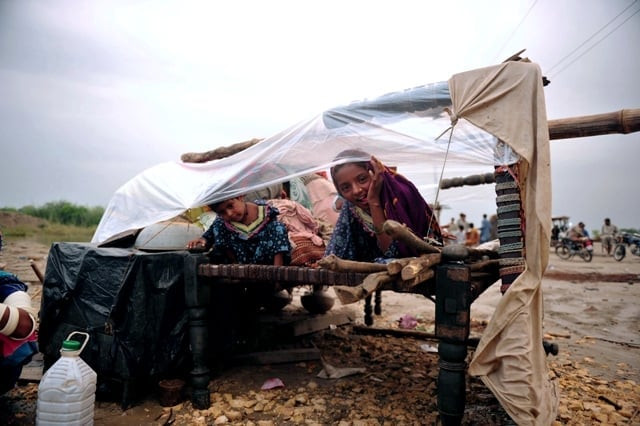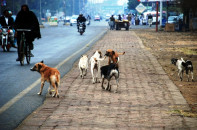Flood victims prepare to share sheets, as winter approaches
"All my three grandchildren have fever and coughs" says Salim Chandio, 60.

"At this time of year, the winds begin to blow from the north rather than the south, and it starts to feel colder at night - especially for all of us sleeping outdoors, with barely a sheet to cover us," said Salim Chandio, 60, adding, "All my three grandchildren have fever and coughs, and we are worried things will get worse if they don't get shelter."
Amina Hasan, a general practitioner who works in the town of Badin said, "Acute respiratory tract infections are always a problem among children living in cramped, crowded conditions - and things could worsen rapidly as the weather cools further in November."
According to the International Organization of Migration (IOM), which a few days ago received a new consignment of shelter kits, blankets and other equipment to help some 15,000 families in Sindh, such supplies are badly needed.
"This shipment is particularly welcome as it comes at a time when our emergency stocks are nearly exhausted. Thousands of families still need our help and winter is fast approaching," said IOM Pakistan emergency operations manager Tya Maskun in a press release, according to a report by IRIN, the UN information unit.
According to the National Disaster Management Authority (NDMA), as of 25 October 8,978,665 people have been affected by floods in Sindh; 462 people have been killed; 538,637 houses have been completely destroyed and more than 900,000 damaged. Sindh's population is estimated at 35 million.
NDMA said 917 relief camps are currently operating, but more help was required.
Saleem Rehmat, a public information officer with IOM, which is leading the emergency shelter cluster for flood victims said, "The international donor response to the funding appeal by UN and the humanitarian partners with regard to the 2011 flood is very bleak. With winter approaching fast, people will be requiring much-needed winterization material not only to provide them with shelter, protection and privacy, but also to save them from possible diseases to which they might be vulnerable in the absence of support."
He said IOM urgently required US$18 million to continue providing shelter and other household items to flood affected people in Sindh, as it is fast running out of contingency stocks.
Other agencies agree people need more help.
"There are still many people managing almost entirely on their own, and just living under canvas sheets," Nazir Hussain, a volunteer for the charitable Edhi Foundation, said in Badin. "Donations from local people have not been generous this time, perhaps because they are so hard hit by inflation themselves."
The UN appeal in September for US$357 million to fund the Pakistan emergency has, according to the media, had a very poor international response. The funding shortfall has been discussed in the National Assembly and at other political forums.
"We can't understand why no one will help us. Some rice has been handed out, but for the longer term we have no idea how to manage. All our livestock are lost, and our crops washed away," said Marvi Bibi, 25, who sleeps in the open with her three-week-old baby girl.



















COMMENTS
Comments are moderated and generally will be posted if they are on-topic and not abusive.
For more information, please see our Comments FAQ